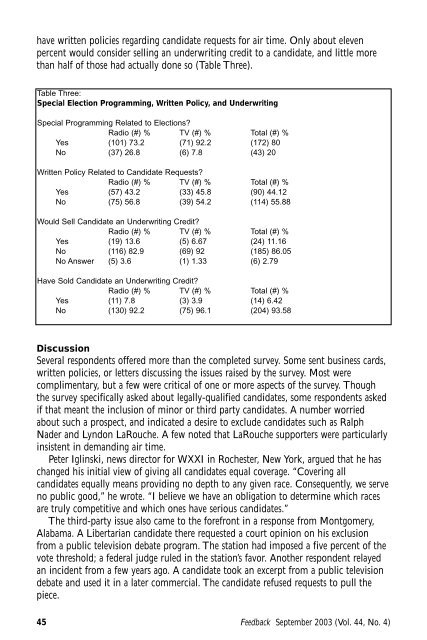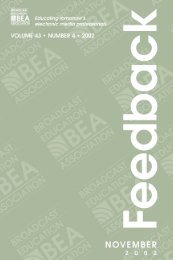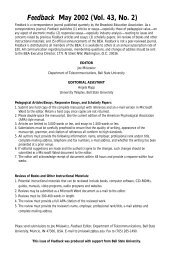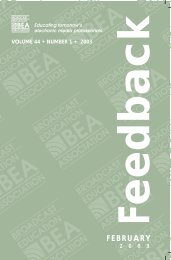PLANNING FOR GROWTH IN YEARS OF RESTRICTED RESOURCES
Feedback September 2003 - Broadcast Education Association
Feedback September 2003 - Broadcast Education Association
You also want an ePaper? Increase the reach of your titles
YUMPU automatically turns print PDFs into web optimized ePapers that Google loves.
have written policies regarding candidate requests for air time. Only about elevenpercent would consider selling an underwriting credit to a candidate, and little morethan half of those had actually done so (Table Three).Table Three:Special Election Programming, Written Policy, and UnderwritingSpecial Programming Related to Elections?Radio (#) % TV (#) % Total (#) %Yes (101) 73.2 (71) 92.2 (172) 80No (37) 26.8 (6) 7.8 (43) 20Written Policy Related to Candidate Requests?Radio (#) % TV (#) % Total (#) %Yes (57) 43.2 (33) 45.8 (90) 44.12No (75) 56.8 (39) 54.2 (114) 55.88Would Sell Candidate an Underwriting Credit?Radio (#) % TV (#) % Total (#) %Yes (19) 13.6 (5) 6.67 (24) 11.16No (116) 82.9 (69) 92 (185) 86.05No Answer (5) 3.6 (1) 1.33 (6) 2.79Have Sold Candidate an Underwriting Credit?Radio (#) % TV (#) % Total (#) %Yes (11) 7.8 (3) 3.9 (14) 6.42No (130) 92.2 (75) 96.1 (204) 93.58DiscussionSeveral respondents offered more than the completed survey. Some sent business cards,written policies, or letters discussing the issues raised by the survey. Most werecomplimentary, but a few were critical of one or more aspects of the survey. Thoughthe survey specifically asked about legally-qualified candidates, some respondents askedif that meant the inclusion of minor or third party candidates. A number worriedabout such a prospect, and indicated a desire to exclude candidates such as RalphNader and Lyndon LaRouche. A few noted that LaRouche supporters were particularlyinsistent in demanding air time.Peter Iglinski, news director for WXXI in Rochester, New York, argued that he haschanged his initial view of giving all candidates equal coverage. “Covering allcandidates equally means providing no depth to any given race. Consequently, we serveno public good,” he wrote. “I believe we have an obligation to determine which racesare truly competitive and which ones have serious candidates.”The third-party issue also came to the forefront in a response from Montgomery,Alabama. A Libertarian candidate there requested a court opinion on his exclusionfrom a public television debate program. The station had imposed a five percent of thevote threshold; a federal judge ruled in the station’s favor. Another respondent relayedan incident from a few years ago. A candidate took an excerpt from a public televisiondebate and used it in a later commercial. The candidate refused requests to pull thepiece.45Feedback September 2003 (Vol. 44, No. 4)
















